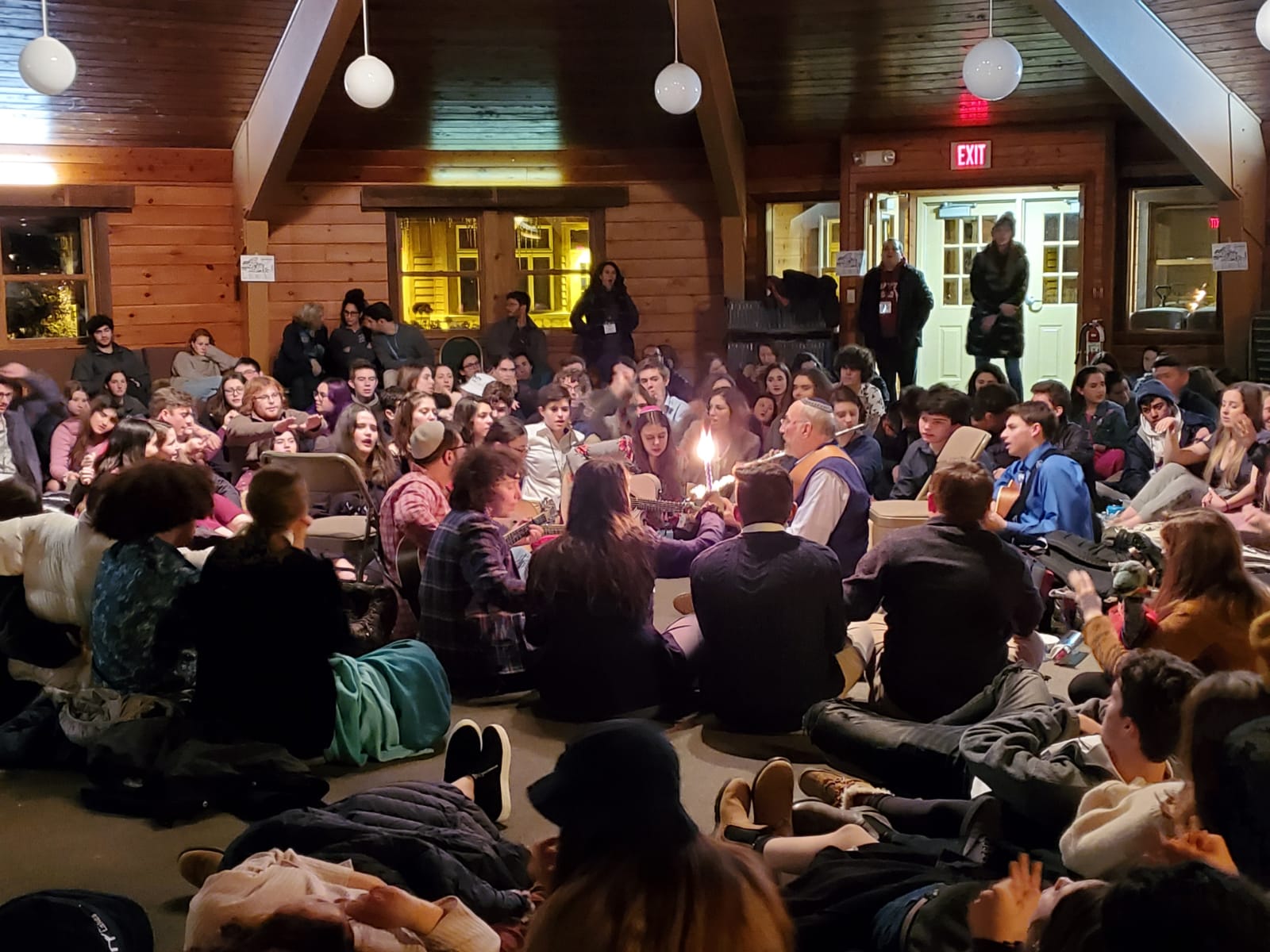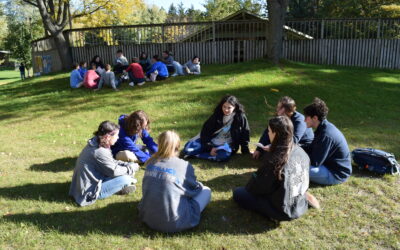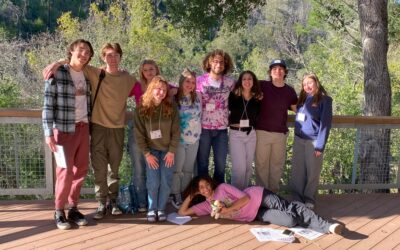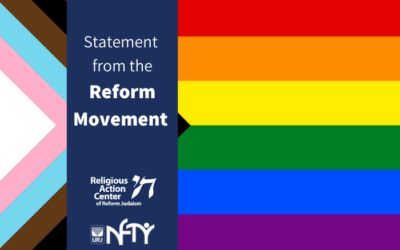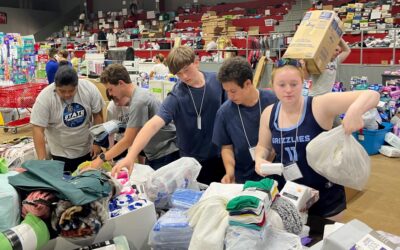By Lev Mosbacher, NFTY President 2021-22
NFTY is in a state of disrepair. We are not where we want to be. What this does not mean is that NFTY is going to disappear from existence. It does not mean that we do not have many dedicated teen leaders who continue to love NFTY for what it is. It has never meant, most pressingly, that the URJ does not care about NFTY.
To be perfectly honest, I experienced that sentiment at the beginning of my term. On one of the first calls that I shared with NFTY’s North American Board, we made a resounding statement — the URJ sucks. And for the first portion of my term? That sentiment remained. But at a certain point, when things were at their most desperate, I came to a realization — no one within the Union wants NFTY to die. No one is plotting NFTY’s financial downfall. No one is even apathetic about NFTY and youth programming in the Reform movement. What is undeniably true, is that there has been a failure of communication. On all levels, the infrastructure has fallen apart. When the layoffs in 2020 hit, we lost the vast, vast majority of our full time staff, and yes, we lost the regional advisors who supported and mentored our teen leaders, on or off regional board or not. But more than that, we lost support. As the world went insane, NFTY and youth programming were lost in the fray. When COVID threatened the camp structure, the URJ’s major source of income, changes were inevitable — NFTY lost access and support from the communications team, the marketing team, the people who worked on the budget, the human resources support, and almost every other major and crucial piece of support that we needed to operate successfully. Over the last year, I watched the few paid staff that NFTY has left pick up the responsibilities, between less than 10 of them, that could only reasonably be expected to be taken care of by a team of 30. This was not an act of malice. Yes, there was misjudgement; yes, there was certainly miscommunication; but the URJ could not put money in the bank accounts of its employees. And that came above all else.
I do, though, recognize that the URJ has had its fair share of failures. For much of this year, and I believe for almost all of last year if not before, the URJ and its staff actively offered at best minimal support to NFTY teen leadership, and even the NFTY North American board. It took me until January of 2022 to realize that if I wanted someone’s support, I was going to have to reach out myself — a task that should never be expected of a leader who has never held this kind of responsibility before. This experience is not unique to me. Every one of my fellow North American board members has had to make their own way. Almost no adults reached out to offer their support unless they were directly tasked with working with us, and this is true too for regional board members who have consistently felt unsupported and unfairly thrust into responsibilities they did not agree to take on, and should never have had to. A large part of this issue is a failure in the kind of culture we have created — the URJ, in my eyes, works under the unhealthy and unsustainable illusion that it has everything under control, and that we don’t need help. This is an issue that existed long before COVID began, and that is evidenced by the fact that engagement and participation numbers were declining quickly long before the pandemic and all of the changes that have happened. Of course, the decline in participation engagement was also due to many other factors like changes in synagogue programming, the culture of NFTY, and a need for a larger strategy overhaul. However, this particular issue is mostly due to the failure of communication. No one has a full understanding of all of the facets of what is happening in and to NFTY, even me. There has been no direct line of communicating our successes, let alone our struggles, with those who are directly affected and/or deeply invested in the success and survival of NFTY. Without those who make up our community — teens, parents, alumni, URJ staff, youth professionals, clergy, and more knowing the struggles NFTY is facing, how could we ever expect for those people to offer support that they don’t know we need?
This is not, of course, to say that no one has offered support. At least in my own life, and I’m sure in the lives of many others, I have talked to a huge number of people who are clearly willing to go to bat for NFTY. These are people who work for the URJ, people who work for synagogues or youth groups, clergy, parents of current, past, and even future NFTY teens, and really people from all walks of life. There is a MASSIVE pool of resources that remains untapped, and will remain untap until we simply ask. Here’s where the good part starts: that’s what we’re doing. I am excited to share that with fundraising and support, we are hoping we will be working towards a major change in staffing structure that will greatly increase ground support for regional leadership. This would include at least one paid part-time staff person in every region, as well as more full-time staff on a purely North American level to handle the logistics that no teen or regional staff person should ever have to handle. Among the most exciting developments, though, is the change in tone we are making, and the culture of giving we are trying to create. In the last few months, I have seen great strides in the financial, structural, and decision-making transparency that URJ staff have shown teen leaders; I am greatly hopeful that this transparency will continue to make its way out into the world long after my term is over. If we are not transparent, and if we do not communicate our failures as well as our successes, then it will continue to be common belief that the URJ does not care about NFTY, that NFTY has reached a point of no return, or even that the Jewish people don’t care about NFTY. I can categorically say that none of these things are true. Even I believed some of them just a few short months ago, but as communication has improved, I have seen that there is so much care in the world for Jewish youth. I just hope that the URJ will make those same strides for the rest of the world, and that all of NFTY’s major pieces of important information, whether good or bad, will be shared without hesitation with the alumni, with parents, and with synagogue staff and clergy.
In the spirit of asking for help, one of the most exciting things coming up for NFTY is the opportunity to offer support not only with time and effort, but money as well. The new staff structure, while important, would not be free, and would only be possible with outside financial assistance — NFTY already runs a budget that hovers around $600,000 in the red by the end of the year, but this will bring the budget even further into the red each year. However, what most people don’t know is that before COVID, NFTY’s budget came out to around $1.8 to $2 million in the red. This is not an unreachable goal, but we need outside help. The URJ simply cannot pull money from other places. We are hoping to raise the money we need to support these infrastructure changes, and then some — I also know that there has been a near complete lack of meaningful leadership development, and we will also raise money for that, including an in-person Mechina leadership summit for regional boards in the fall. On top of the structural changes we already want to make, we also know that each region has different needs and requires different kinds of support. I am pained to admit that regions have not fundraised solely because we have not provided the infrastructure or support that they would need to — we are pushing to create a culture where, for example, if a region wants to hire their regional advisor full-time, wants a camp in their area to hire a part-time NFTY liaison to make it easier to plan events at that camp, or even just wants to fundraise to run an event they might not otherwise be able to, then not only will it be clear that they are allowed to do so, but the NFTY and the URJ will actively support them in fundraising that money.
I would like to say that I am not angry. I would like to say that it does not hurt me to see NFTY in the state it currently is. I can’t say either of those things, or I’d be lying. But what I can say is that I am hopeful. I am confident that there are adults and teens, inside and outside of the URJ, who care enough about NFTY to make it work. I am proud of the work I am doing. I am proud of the work we are doing. Yes, we need help, and we need to be willing to ask for it if we want to succeed. But the work we have done, given the resources we have, is incredible. Nothing will take that away.

